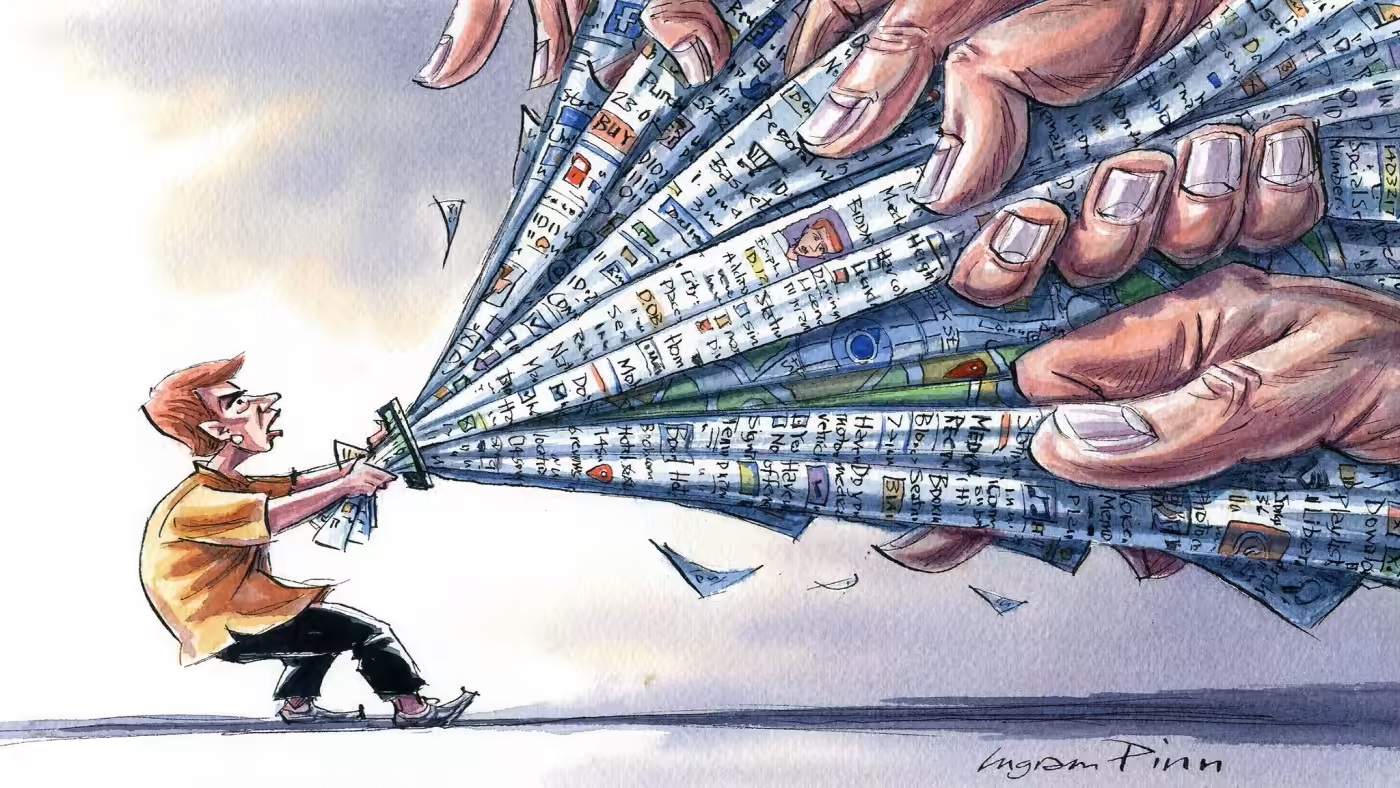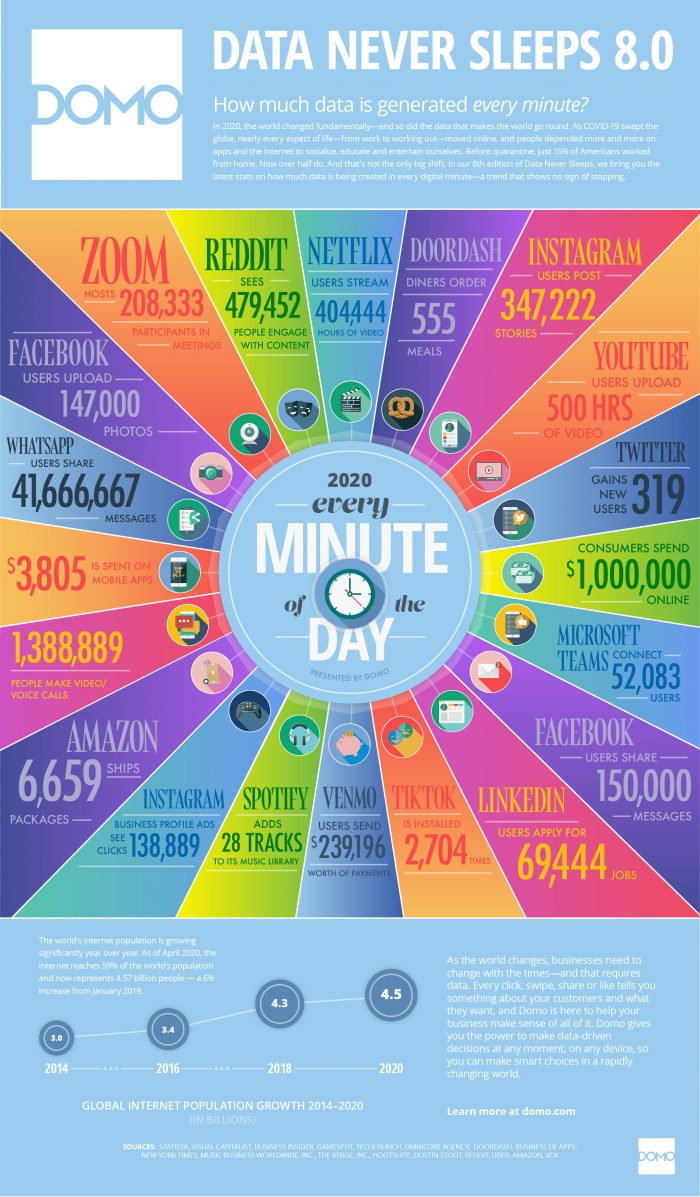NEWS
MY DATA MY GAIN
News 14
Our personal data are precious — we must take back control
It's time to wake up, regain our control over our data and retain a part of the value that these generate. "My Data My Gain”
a) Did you think you had bought a convenient cleaning appliance? Amazon thinks that the plans of your house are worth much more, and they are paying Roomba $1.7Bn (See "Its not the dust, its the data" on Wired).
Considering that Roomba has sold +/- 12M appliances, the data of your house (blueprints, uses, number of people, etc) are valued $75-$125
b) Do you think that having a hyperconnected car, with GPS, security, all type of maps, convenient online assistance etc is an excellent choice? Maybe you should consider who is making money directly out of your pocket:(See "Who is collecting data from your car?" on The Markup )
c) Do you love the idea of having lots of apps always running? You are paying a price for them -see the impact of dynamic pricing in your day to day life. (See article in WSJ)
All the warnings stated in Sarah Gordon's FT article back on 2017 are now materializing ... 5 years later we haven't learned yet.
"My Data My Gain initiative aims to empower individuals to directly manage and monetise their personal data based on the GDPR purpose limitation, so that customers can share their data under GDPR-compliant "standard conditions", granting companies access to 1st party data, to be used for a certain purpose, for a certain time, for an agreed price.
The monetisation of personal data, subject to the sound EU regulatory framework, will not only achieve the protection of individuals and the development of a European data ecosystem, but will also cut the dependence on technology giants, leading to a more competitive, efficient and secure online environment.
"My Data My Gain” will provide tools to pursue these goals. Soon.
(Image used is part of referred FT article)
It's time to wake up, regain our control over our data and retain a part of the value that these generate. "My Data My Gain”
a) Did you think you had bought a convenient cleaning appliance? Amazon thinks that the plans of your house are worth much more, and they are paying Roomba $1.7Bn (See "Its not the dust, its the data" on Wired).
Considering that Roomba has sold +/- 12M appliances, the data of your house (blueprints, uses, number of people, etc) are valued $75-$125
b) Do you think that having a hyperconnected car, with GPS, security, all type of maps, convenient online assistance etc is an excellent choice? Maybe you should consider who is making money directly out of your pocket:(See "Who is collecting data from your car?" on The Markup )
c) Do you love the idea of having lots of apps always running? You are paying a price for them -see the impact of dynamic pricing in your day to day life. (See article in WSJ)
All the warnings stated in Sarah Gordon's FT article back on 2017 are now materializing ... 5 years later we haven't learned yet.
"My Data My Gain initiative aims to empower individuals to directly manage and monetise their personal data based on the GDPR purpose limitation, so that customers can share their data under GDPR-compliant "standard conditions", granting companies access to 1st party data, to be used for a certain purpose, for a certain time, for an agreed price.
The monetisation of personal data, subject to the sound EU regulatory framework, will not only achieve the protection of individuals and the development of a European data ecosystem, but will also cut the dependence on technology giants, leading to a more competitive, efficient and secure online environment.
"My Data My Gain” will provide tools to pursue these goals. Soon.
(Image used is part of referred FT article)

News 13
The battle of data
Electronic Frontier Foundation (EFF) issued an article “Why Getting Paid for Your Data Is a Bad Deal”, and they fear that the “battle of data is lost”.
In it they point out these issues:
a) Once a company gets our data, there is no control on them.
b) We'd be selling our private life for scraps ( For scraps?? Definitively not in US or EU... See a good estimate of the value of our data at our previous entry "Useless, Worthless or Priceless?")
c) The value of data only has sense through aggregation. That is why platforms lead the market, as they are the only ones that can access large amount of data.
d) Pay-for-privacy and data dividends are two sides of the same coin. “Once you recognise that data have some set monetary value…. an exchange of data would endanger people and commodify privacy”.
The solution EFF proposes is to change the procedure from “Consent” to “Opt-in”, based on the idea that behavioural data are temporally sensitive. Much of your information has an expiration date, and companies that rely on it will always want to come back to the well for more of it. As the source, consumers should have more of the control.
The problem is not whether the "data battle is lost" or not.
The problem lies with the availability of data and its trading.
Once data brokers/intermediaries get our data, they can sell it as many times as they want. There is no limitation, because THEY obtained the data -or we gave them our data unknowingly. At that point, the law of supply & demand kicks in with no control.
GDPR requires consent –therefore reducing the amount of “free available data” to data brokers/intermediaries. It also allows for purpose limitation. As such, under GDPR we control our data and we can decide to share it with a certain “controller” for a certain purpose for a certain time, and receive compensation for it.
Still, considering how the decission-making process is instrumented, there is not much difference between Consent and Opt-in. Both would be subject to "mechanical proceduralism" as we covered in our previous entry "Value of Data vs Privacy…. But, why not both?
No matter the procedure, "My Data My Gain” approach has the following benefits:
a) Individuals will be aware of the value of their data.
b) Our data are sold directly to the data user, for a certain time, for a certain purpose. No re-sale is allowed and GDPR protects us.
c) Companies will be now able to directly obtain our data -for a price-.They will no longer be dependent on the "interpretation" of our data/profile/cohort defined, identified and provided by the large platform: They will be able to access and process their users/customers data in-house.
Nowadays, Customer Data Platforms make this possible and cost-effective.
The monetisation of personal data, subject to a sound regulatory framework, will not only achieve the protection of individuals and the development of a European data ecosystem, but will also cut the dependence on technology giants, leading to a more competitive, efficient and secure online environment.
"My Data My Gain initiative aims to empower individuals to directly manage and monetise their personal data based on the GDPR purpose limitation, so that customers can share their data under GDPR-compliant "standard conditions", granting companies access to 1st party data, to be used for a certain purpose, for a certain time, for an agreed price.
"My Data My Gain” will provide tools to pursue these goals. Soon.
See EFF's article “Why Getting Paid for Your Data Is a Bad Deal"
(image courtesy of IT ProPortal (link)
Electronic Frontier Foundation (EFF) issued an article “Why Getting Paid for Your Data Is a Bad Deal”, and they fear that the “battle of data is lost”.
In it they point out these issues:
a) Once a company gets our data, there is no control on them.
b) We'd be selling our private life for scraps ( For scraps?? Definitively not in US or EU... See a good estimate of the value of our data at our previous entry "Useless, Worthless or Priceless?")
c) The value of data only has sense through aggregation. That is why platforms lead the market, as they are the only ones that can access large amount of data.
d) Pay-for-privacy and data dividends are two sides of the same coin. “Once you recognise that data have some set monetary value…. an exchange of data would endanger people and commodify privacy”.
The solution EFF proposes is to change the procedure from “Consent” to “Opt-in”, based on the idea that behavioural data are temporally sensitive. Much of your information has an expiration date, and companies that rely on it will always want to come back to the well for more of it. As the source, consumers should have more of the control.
The problem is not whether the "data battle is lost" or not.
The problem lies with the availability of data and its trading.
Once data brokers/intermediaries get our data, they can sell it as many times as they want. There is no limitation, because THEY obtained the data -or we gave them our data unknowingly. At that point, the law of supply & demand kicks in with no control.
GDPR requires consent –therefore reducing the amount of “free available data” to data brokers/intermediaries. It also allows for purpose limitation. As such, under GDPR we control our data and we can decide to share it with a certain “controller” for a certain purpose for a certain time, and receive compensation for it.
Still, considering how the decission-making process is instrumented, there is not much difference between Consent and Opt-in. Both would be subject to "mechanical proceduralism" as we covered in our previous entry "Value of Data vs Privacy…. But, why not both?
No matter the procedure, "My Data My Gain” approach has the following benefits:
a) Individuals will be aware of the value of their data.
b) Our data are sold directly to the data user, for a certain time, for a certain purpose. No re-sale is allowed and GDPR protects us.
c) Companies will be now able to directly obtain our data -for a price-.They will no longer be dependent on the "interpretation" of our data/profile/cohort defined, identified and provided by the large platform: They will be able to access and process their users/customers data in-house.
Nowadays, Customer Data Platforms make this possible and cost-effective.
The monetisation of personal data, subject to a sound regulatory framework, will not only achieve the protection of individuals and the development of a European data ecosystem, but will also cut the dependence on technology giants, leading to a more competitive, efficient and secure online environment.
"My Data My Gain initiative aims to empower individuals to directly manage and monetise their personal data based on the GDPR purpose limitation, so that customers can share their data under GDPR-compliant "standard conditions", granting companies access to 1st party data, to be used for a certain purpose, for a certain time, for an agreed price.
"My Data My Gain” will provide tools to pursue these goals. Soon.
See EFF's article “Why Getting Paid for Your Data Is a Bad Deal"
(image courtesy of IT ProPortal (link)

News 12
Data Never Sleeps 8.0
The new 2020 8th edition of “Data Never Sleeps” by DOMO summarizes the size, activities, trends and evolution of activities and business in internet.
It is astounding how an infographic can show so much information on users, engagement, channels, companies, media, software & apps, goods & services, market segments, etc. and how meaningful each of its components is when compared and framed with the rest.
However, it does not include search engines or some of the most relevant names, particularly those that thrive in non-Western countries. These are the ones benefiting the most from the 50% increase in world internet users in 6 years.
It is also interesting to look at the dynamics of the last 8 years (see 2nd Infographics by Visual Capitalist). How some actors have been able to continue to attract users, how the business model of others has not kept them on the list and how users adapt swiftly to the new services on offer.
Even so, money is the one piece missing from these two infographics.
In terms of revenue, some of the Internet-based services listed are based on monthly or annual subscriptions, others are based on transactions and purchases, others have freemium business models and others are directly free.
In terms of their bottom line, some of them have robust business models that generate solid and recurring profits; others have been struggling to find a sound monetisation strategy.
And whilst it would be interesting to compare the overall turnover of these businesses as well as their profits, there is a more relevant figure that should focus our attention.
The missing figure is how much of their overall revenue and profits does not originate from transactions (for example, subscribing to a music service and gaining access to music) but from the processing of the siphoned users' personal information.
If Facebook earned US$70.9 billion in revenue from its impressive 2.7 billion users, how much of that US$26,25 Average Revenue Per User is based on siphoning users' personal data? Or if we take geographical segmentation, of the US$33.9 billion in revenue earned in the US and Canada from 244.6 million users, how much of that US$138.6 ARPU is based on siphoning and processing users' personal data?
The debate on the use of personal data in the US is now everywhere and different alternatives are being considered, as we covered in previous entries.
But in Europe things are -for once- more advanced and the GDPR is leading the way and inspiring legislation in many other countries. Still, there is a gap between the law and the day to day use of that law.
"My Data My Gain” initiative aims to close this gap by empowering individuals to directly manage and monetise their Personal Data based on GDPR Purpose Limitation, whereby customers can share on ‘standard data sharing terms’ under GDPR, enabling companies to access 1st party data for a certain purpose over a certain period of time, for a certain price.
"My Data My Gain” will provide tools to pursue these goals. Soon.
(info-graphics courtesy of DOMO (link) and Visual Capitalist (link)
The new 2020 8th edition of “Data Never Sleeps” by DOMO summarizes the size, activities, trends and evolution of activities and business in internet.
It is astounding how an infographic can show so much information on users, engagement, channels, companies, media, software & apps, goods & services, market segments, etc. and how meaningful each of its components is when compared and framed with the rest.
However, it does not include search engines or some of the most relevant names, particularly those that thrive in non-Western countries. These are the ones benefiting the most from the 50% increase in world internet users in 6 years.
It is also interesting to look at the dynamics of the last 8 years (see 2nd Infographics by Visual Capitalist). How some actors have been able to continue to attract users, how the business model of others has not kept them on the list and how users adapt swiftly to the new services on offer.
Even so, money is the one piece missing from these two infographics.
In terms of revenue, some of the Internet-based services listed are based on monthly or annual subscriptions, others are based on transactions and purchases, others have freemium business models and others are directly free.
In terms of their bottom line, some of them have robust business models that generate solid and recurring profits; others have been struggling to find a sound monetisation strategy.
And whilst it would be interesting to compare the overall turnover of these businesses as well as their profits, there is a more relevant figure that should focus our attention.
The missing figure is how much of their overall revenue and profits does not originate from transactions (for example, subscribing to a music service and gaining access to music) but from the processing of the siphoned users' personal information.
If Facebook earned US$70.9 billion in revenue from its impressive 2.7 billion users, how much of that US$26,25 Average Revenue Per User is based on siphoning users' personal data? Or if we take geographical segmentation, of the US$33.9 billion in revenue earned in the US and Canada from 244.6 million users, how much of that US$138.6 ARPU is based on siphoning and processing users' personal data?
The debate on the use of personal data in the US is now everywhere and different alternatives are being considered, as we covered in previous entries.
But in Europe things are -for once- more advanced and the GDPR is leading the way and inspiring legislation in many other countries. Still, there is a gap between the law and the day to day use of that law.
"My Data My Gain” initiative aims to close this gap by empowering individuals to directly manage and monetise their Personal Data based on GDPR Purpose Limitation, whereby customers can share on ‘standard data sharing terms’ under GDPR, enabling companies to access 1st party data for a certain purpose over a certain period of time, for a certain price.
"My Data My Gain” will provide tools to pursue these goals. Soon.
(info-graphics courtesy of DOMO (link) and Visual Capitalist (link)




